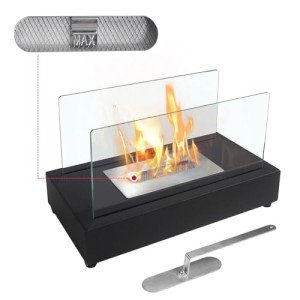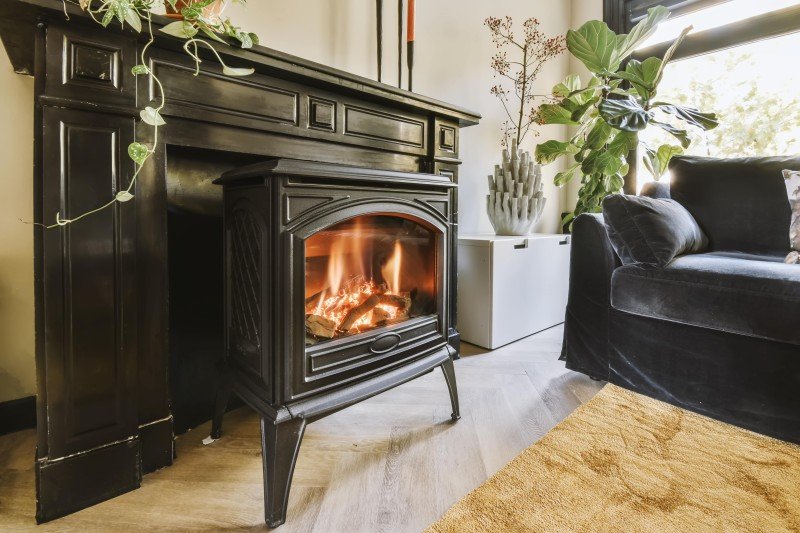In the quest for sustainable, eco-friendly heating solutions, bioethanol fires have emerged as a popular choice. These modern, fuel-efficient devices offer a unique blend of aesthetics and environmental benefits, making them an attractive alternative to traditional wood and gas fires. However, like any technology, bioethanol fires come with their own set of advantages and disadvantages. This article delves into the pros and cons of bioethanol fires, providing a comprehensive overview to help readers make informed decisions.
What are Bioethanol Fires?
Bioethanol fires, also known as ethanol or alcohol fires, are heating devices that burn bioethanol, a renewable fuel made from fermented plant materials such as corn, sugarcane, and switchgrass. Unlike traditional fires, bioethanol fires do not require a chimney or flue, making them highly versatile and easy to install. They are available in various designs, including free-standing, wall-mounted, and built-in models, and are often used in modern interior settings for their sleek and minimalist appearance.
Pros of Bioethanol Fires
-
Environmentally Friendly
- Renewable Fuel: Bioethanol is a renewable resource, which means it can be continually produced without depleting natural reserves. This makes bioethanol fires a more sustainable option compared to fossil fuel-based heating systems.
- Low Emissions: Burning bioethanol produces minimal emissions, primarily water vapor and carbon dioxide (CO2). Unlike wood fires, they do not release particulate matter, sulfur dioxide, or other harmful pollutants.
- Carbon Neutral: When bioethanol is burned, the CO2 released is roughly equal to the amount absorbed by the plants during their growth. This makes bioethanol fires carbon neutral, contributing to a reduction in the overall carbon footprint.
-
Ease of Installation and Maintenance
- No Chimney Required: One of the most significant advantages of bioethanol fires is that they do not need a chimney or flue. This makes installation straightforward and can be a cost-effective solution for homes and businesses.
- Minimal Maintenance: Unlike wood or gas fires, bioethanol fires require minimal maintenance. There is no need to clean chimneys or deal with ash and soot, making them a low-hassle option.
- Portability: Many bioethanol fire designs are portable, allowing users to move them from room to room or even take them to outdoor settings.
-
Aesthetic Appeal
- Modern Design: Bioethanol fires are known for their sleek and contemporary designs, which can enhance the aesthetic appeal of any room. They are available in a variety of styles and sizes, making them suitable for both residential and commercial spaces.
- Flame Visibility: The flames in bioethanol fires are often more visible and dynamic compared to those in traditional fires, providing a mesmerizing and relaxing visual experience.
-
Energy Efficiency
- Instant Heat: Bioethanol fires provide instant heat, eliminating the need to wait for the fire to warm up. This is particularly useful in small spaces where quick heating is desired.
- Adjustable Heat Output: Many bioethanol fires come with adjustable heat settings, allowing users to control the amount of heat they produce. This can help in conserving energy and reducing fuel consumption.
-
Safety and Convenience
- No Gas or Electricity Required: Bioethanol fires can operate without the need for gas connections or electrical power, making them a versatile option for off-grid locations or areas with limited infrastructure.
- No Risk of Gas Leaks: Since bioethanol fires do not use natural gas or propane, there is no risk of gas leaks, which can be a significant safety concern in traditional gas fires.
- Automatic Shut-Off: Some bioethanol fire models come equipped with automatic shut-off features, which can enhance safety by preventing the fire from continuing to burn unattended.
Cons of Bioethanol Fires
-
Heat Output and Efficiency
- Lower Heat Output: Bioethanol fires generally produce less heat compared to wood or gas fires. They are best suited for small rooms or as supplemental heating sources and may not be effective in large, open spaces.
- Energy Efficiency: While bioethanol fires are efficient in terms of heat delivery, they are not as energy-efficient as some other heating options. The heat produced is often not sufficient to warm an entire house, and the fuel can be expensive in larger quantities.
-
Cost Considerations
- Initial Cost: High-quality bioethanol fire models can be expensive, and the cost of bioethanol fuel can add up over time, especially if used frequently.
- Fuel Availability and Cost: Bioethanol fuel is not as widely available as other heating fuels, and the costs can vary depending on the region and supplier. This can be a drawback for users in remote or rural areas.
-
Operational Limitations
- Refilling: Bioethanol fires need to be refilled periodically, which can be an inconvenience. The frequency of refilling depends on the size of the fire and the duration of use.
- Limited Burn Time: The burn time of a bioethanol fire is typically shorter compared to wood or gas fires. A single refill may last only a few hours, requiring users to manage the fuel supply carefully.
- Flame Control: While some bioethanol fires allow for flame adjustment, the control is often not as precise as in gas or wood fires. This can make it challenging to achieve the desired heat level or flame appearance.
-
Safety Concerns
- Flammability: Bioethanol is a highly flammable liquid, and proper handling is crucial to avoid accidents. Users must be cautious when refilling and operating the fire to prevent spills and fires.
- Ventilation: Although bioethanol fires do not produce harmful pollutants, proper ventilation is still recommended to ensure the safety and comfort of the room. In poorly ventilated areas, the buildup of CO2 can lead to stale air or discomfort.
-
Regulatory and Insurance Issues
- Building Codes: Some regions may have specific building codes or regulations that affect the installation and use of bioethanol fires. Users should check local regulations before purchasing.
- Insurance: Home insurance policies may not cover bioethanol fires or may require additional premiums or conditions. It is advisable to consult with an insurance provider to understand the implications.
Comparison Table: Bioethanol Fires vs. Traditional Fires
| Feature | Bioethanol Fires | Traditional Fires (Wood/Gas) |
|---|---|---|
| Fuel Type | Bioethanol (renewable) | Wood or Gas (non-renewable) |
| Emissions | Low (water vapor and CO2) | High (particulate matter, sulfur dioxide) |
| Installation | Easy (no chimney or flue required) | Requires chimney or flue |
| Maintenance | Minimal (no ash or soot) | Regular (cleaning chimney, ash removal) |
| Aesthetic | Modern, sleek designs | Traditional, varied designs |
| Heat Output | Lower, suitable for small spaces | Higher, suitable for large spaces |
| Cost | High initial cost, ongoing fuel cost | Lower initial cost, ongoing fuel cost |
| Safety | Generally safe with proper handling | Potential gas leaks, ash risks |
| Regulatory Issues | May require specific permits | Generally well-regulated |
FAQs About Bioethanol Fires
Q: Are bioethanol fires safe to use in my home? A: Bioethanol fires are generally safe when used with proper handling and ventilation. However, users should be cautious when refilling the fuel and ensure that the fire is placed on a stable, heat-resistant surface. Additionally, automatic shut-off features and fire extinguishers can enhance safety.
Q: How often do I need to refill a bioethanol fire? A: The frequency of refilling depends on the size of the fire and the duration of use. On average, a bioethanol fire may need to be refilled every few hours, especially if used continuously.
Q: Can bioethanol fires be used outdoors? A: Yes, many bioethanol fire models are designed for outdoor use. They are portable and do not require a chimney, making them ideal for patios, decks, and other outdoor spaces.
Q: Do bioethanol fires produce a strong smell? A: When bioethanol is burned, it produces a mild, alcohol-like smell. This smell is generally not strong and is often described as pleasant. However, some users may find it noticeable, especially during the initial burn.
Q: Are bioethanol fires as effective as traditional wood or gas fires for heating? A: Bioethanol fires are generally less effective in terms of heat output compared to traditional wood or gas fires. They are best suited for small spaces or as supplemental heating sources.
Q: Can I use any type of bioethanol in my fire? A: No, it is essential to use only bioethanol fuel specifically designed for bioethanol fires. Using other types of alcohol or fuels can be dangerous and may damage the fire.
Q: Are bioethanol fires covered by home insurance? A: Home insurance policies may not cover bioethanol fires or may require additional premiums or conditions. It is advisable to consult with an insurance provider to understand the implications.
Bioethanol fires offer a unique combination of environmental benefits, ease of use, and aesthetic appeal. They are particularly suitable for small spaces, modern interiors, and users looking for a low-maintenance heating solution. However, they come with certain limitations, including lower heat output, higher initial and ongoing costs, and safety considerations. By weighing the pros and cons, potential users can determine whether a bioethanol fire is the right choice for their needs.
Whether used as a primary heating source or a decorative feature, bioethanol fires represent a step towards more sustainable and modern living. As technology continues to advance, the efficiency and safety of bioethanol fires are likely to improve, making them an increasingly viable option in the future.






